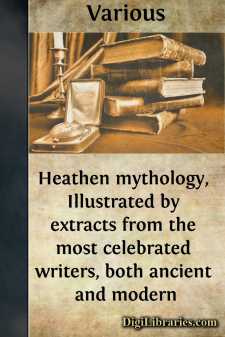Categories
- Antiques & Collectibles 13
- Architecture 36
- Art 48
- Bibles 22
- Biography & Autobiography 813
- Body, Mind & Spirit 142
- Business & Economics 28
- Children's Books 17
- Children's Fiction 14
- Computers 4
- Cooking 94
- Crafts & Hobbies 4
- Drama 346
- Education 46
- Family & Relationships 57
- Fiction 11829
- Games 19
- Gardening 17
- Health & Fitness 34
- History 1377
- House & Home 1
- Humor 147
- Juvenile Fiction 1873
- Juvenile Nonfiction 202
- Language Arts & Disciplines 88
- Law 16
- Literary Collections 686
- Literary Criticism 179
- Mathematics 13
- Medical 41
- Music 40
- Nature 179
- Non-Classifiable 1768
- Performing Arts 7
- Periodicals 1453
- Philosophy 64
- Photography 2
- Poetry 896
- Political Science 203
- Psychology 42
- Reference 154
- Religion 513
- Science 126
- Self-Help 84
- Social Science 81
- Sports & Recreation 34
- Study Aids 3
- Technology & Engineering 59
- Transportation 23
- Travel 463
- True Crime 29
Heathen mythology, Illustrated by extracts from the most celebrated writers, both ancient and modern
by: Various
Description:
Excerpt
Upon a subject which has occupied the thoughts, and employed the pens of our most profound thinkers, and our ablest writers, it is perhaps difficult to say much that is likely to interest the reader, without the chance of being irksome from its proving a thrice told tale: and yet the subject is in itself so interesting, and so intimately connected with all that is most fascinating to our remembrances, and so blended with all that reminds us of departed greatness, that it is scarcely possible to pass it coldly by, or to speak in the language of others those ideas which excite our own imaginations.
There was something very pleasing and very poetical in the thought, that each river had its nymph, and every wood its god: that a visible power watched over even the domestic duties of the people, ready to punish or reward; and that, too in a manner so strange and immediate, that it must have greatly affected their minds in stimulating to good, or deterring from evil. They were, indeed, the days of "visible poetry;" the "young hunter," in the pursuit of his favourite sport, might image to his mind the form and figure of Diana, accompanying him in the chase, not perhaps without a holy fear lest she should become visible to him, and the fate of Acteon should prove to be his.
The lover, as he sought the presence of his mistress, might, in his enamoured idea of her beauty, fancy that his idolatry was a real one, and that he wooed Venus in the form of a mortal: or, in the tremor which then as now pervaded the lover's bosom, he might fear that Jove himself would prove a rival, and, swan-like, or in some other as picturesque a form, win her he sought for his own: and thus, every class of society, from the patrician to the peasant, must have been imbued with feelings which, while they believed them to be religious, we regard but as poetical.
Leigh Hunt, who has said many things upon Mythology, quite as beautiful as his subject, remarks:—
"From having a different creed of our own, and always encountering the Heathen Mythology in a poetical and fabulous shape, we are apt to have a false idea of the religious feeling of the ancients. We are in the habit of supposing, that they regarded their fables in the same poetical light as ourselves; that they could not possibly put faith in Jupiter, Neptune, and Pluto; in the sacrifice of innocent turtle doves, the libation of wine, and the notions about Tartarus and Ixion.
"The greatest pleasure arising to a modern imagination from the ancient Mythology, is in a mingled sense of the old popular belief, and of the philosophical refinements upon it. We take Apollo, and Mercury and Venus, as shapes that existed in popular credulity, as the greater fairies of the ancient world: and we regard them, at the same time, as personifications of all that is beautiful and genial in the forms and tendencies of creation. But the result, coming, as it does too, through avenues of beautiful poetry, both ancient and modern, is so entirely cheerful, that we are apt to think it must have wanted gravity to more believing eyes. Every forest, to the mind's eye of a Greek, was haunted with superior intelligences. Every stream had its presiding nymph, who was thanked for her draught of water. Every house had its protecting gods which had blessed the inmate's ancestors; and which would bless him also, if he cultivated the social affections: for the same word which expressed piety towards the Gods, expressed love towards relations and friends. If in all this there was nothing but the worship of a more graceful humanity, there may be worships much worse as well as better....












